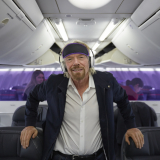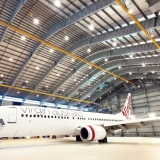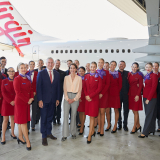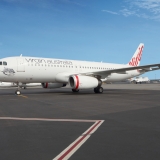Virgin Australia’s sustainable aviation fuel flies one million kilometres
Virgin Australia has moved one step closer to readying itself for the commercial use of sustainable aviation fuel, today announcing that aircraft had flown more than one million kilometres under its current trial.
Since August 2018, Virgin Australia has welcomed four deliveries of the low-carbon aviation fuel, which has then been blended with traditional jet fuel and supplied into the general fuel supply system at Brisbane Airport. All aircraft operating in and out of Brisbane were then fuelled with this product.
Virgin Australia has led an Australian-first by conducting such an initiative in Brisbane, as this has been the first time that any airport in Australia has had sustainable aviation fuel incorporated into the regular airport fuelling infrastructure.
The four deliveries, which arrived in August, December, February and June, have fuelled more than 700 flights, flying to a diverse range of domestic and international destinations.
Virgin Australia, in partnership with the Queensland Government, Brisbane Airport Corporation, US-based biofuel producer Gevo, Inc. and supply chain partners Caltex and DB Schenker, first announced its intention to start the trial in October 2017.
The focus was to work across the supply chain to move one step closer to a thriving sustainable aviation fuels industry in Australia.
Virgin Australia Chief Legal and Risk Officer, Dayna Field, said the one million kilometres flown represents an important milestone and demonstrates that this low carbon product can go the distance.
“Virgin Australia is proud to have led this initiative in Brisbane, as it has been an important step in promoting the use and production of sustainable aviation fuels in our region.
“We are actively looking at ways to reduce our carbon emissions and low-carbon fuels present a real opportunity. As a diversified airline group, we know that establishing a local low-carbon fuel industry will have positive environmental, social and economic impacts,” she said.
Brisbane Airport Corporation Chief Executive Officer, Gert-Jan de Graaff, said that sustainable aviation fuel was a perfect example of airlines and airports working together to achieve sustainable targets.
“Brisbane Airport recognises the importance of working with its airline partners to implement practices that will ensure a greener future for our industry. We will continue to collaborate with Virgin Australia as further opportunities are identified to expand upon the sustainable aviation fuel agenda moving forward,” Mr de Graaf said.
Gevo, Inc Chief Executive Officer, Patrick R. Gruber, said that one million kilometres was only the beginning of how far sustainable aviation fuel could travel in the future.
“We are pleased to be working with Virgin Australia to get our de-fossilised, sustainable jet fuel into the Australian air. We appreciate the effort of all the project partners, who have worked hard to commence the transformation of the Australian jet fuel supply chain, to make it ready for aircraft to uptake such fuel. This is a very good milestone which demonstrates the potential for the future,” he said.
Caltex Executive General Manager, Fuels & Infrastructure, Louise Warner, said the successful trial is an important step in understanding the potential for alternative aviation fuels in Australia’s fuel mix.
“Caltex is committed to playing a role in the transition to a low carbon future and working with our partners to identify alternative fuel solutions for the aviation sector. We look forward to further discussions on opportunities for alternative aviation fuels with Virgin Australia and the Queensland Government,” Ms Warner said.






